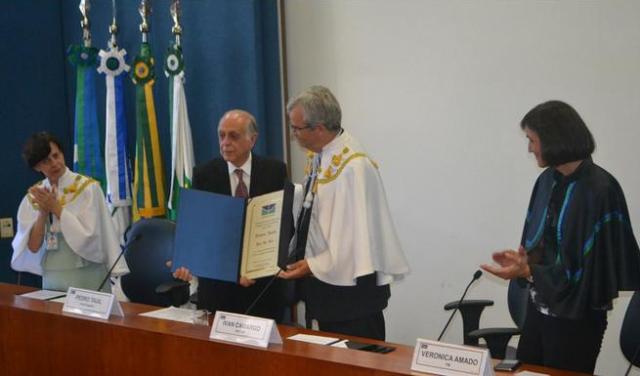
Brasilia University emmerit professor Pedro Tauil defends poverty reduction to fight tropical diseases
Researchers also defends more enhanced actions by the public health services for the Countrys poorest people
10/03/2016
For Dr. Pedro Tauil it is important to enhance basic attention and establish an effective reference and counter reference system, as well as basic and specialized care
Recently honored as Emeritus Professor of the Brasilia University, UnB, Dr. Pedro Tauil has concerns reaching far beyond the scientific field, covering especially the social aspects of problems common to Brazilian citizens. His thought is reflected on what is needed to combat tropical diseases in the Country. The answer is not related to the necessary actions and control measures. Not at first place.
To the epidemiologist, professor and member of the Fiocruz Superior Counsil, the main obstacle to combat tropical diseases is reducing poverty. He defends that we must provide a decent life, basic sanitation and education opportunities for the entire Brazilian population.
Doctor Pedro Tauil speaks about this and other subjects related to over 30 years dedicated to reseach and education in an interview to the Brazilian Society of Tropical Medicine. (BSTM)
Find below the full interview:
BSTM: What is your opinion regarding the combat against tropical diseases in Brazil and the World? Are there still many obstacles?
Dr. Pedro Tauil: Yes, there are several obstacles, but the main one is poverty reduction, providing a decent life of work, housing, basic sanitation and education opportunity for all the Brazilian population. Besides this, enhancing the organization of public services in order to provide good quality, preventive and healing measures for all the Countrys poor population, increasing basic attention and establishing an effective reference and counter reference system, covering basic and specialized care.
BSTM: One of your especialities is Dengue control. In your opinion, are the current actions enough to combat the Aedes aegypti?
Dr. Pedro Tauil: No. We also need innovation: vaccines and effective and safe ethiological treatment, vector control enhancement, as mosquitoes infected with the Wolbachia bacteria, currently in development, and more effective education and social communication.
BSMT: Would you also point any ongoing project that could enhance the control of tropical diseases in Brazil? Which one?
Dr. Pedro Tauil: There is a project, originally from Australia, for the control of diseases transmitted by the Aedes aegypti, in development in several countries including Brazil, at Fiocruz, consisting of infecting mosquitoes with the Wolbachia bacteria, making these mosquitos to become non-infective. Another highlight is the 3rd clinical phase of the dengue vaccine, being developed by the Butantã Institute and the NIH, in the USA. Besides this, there are serological tests to diagnose zika, in development by several groups in Brazil and other countries From Brazil I can mention the Evandro Chagas Institute, in Belém, Pará.
BSTM: During these 30 years at UnB, which are the main research projects you participated and would like to highlight?
Dr. Pedro Tauil: They are within the epidemiology and endemic diseases field. Among them:
– Some aspects of the malaria epidemiology in Porto Nacional, Goiás.
– Assessment of the Malaria Control Intensification Plan in the Amazon.
– Elimination of malaria transmission in Santa Catarina
– Control of the dengue outbreak in Boa Vista, RR, in 1982
– Evolution of the average death age by schistosomiasis mansoni in Brazil
– Vaccination against yellow fever and auto-immune diseases
– Algorithm to monitor the malaria incidence in the Brazilian Amazon
– Malaria epidemics in the Amazon
– Control of vector borne diseases in Brazil
– Critical aspects of yellow fever control in Brazil
– Challenges to control dengue and other diseases transmitted by the Aedes aegypti
BSTM: Who were the people that most helped you become one of the most respected professors in the Country?
Dr. Pedro Tauil: They were many. Among them, professors: Leônidas de Mello Deane, Maurício Gomes Pereira, Aluísio Prata, Joffre Marcondes de Rezende, Luiz Rassi, Vanize Macedo and Luiz Rey. My work colleagues in Porto Nacional, GO: Antônio Carlos Azevedo and Eduardo Manzano. My superiors at the Health Ministry: Ministers Paulo de Almeida Machado and Waldir Arcoverde and Dr. José Taquarussu Fiusa Lima. My colleagues at SUCAM: Antônio Carlos Silveira, Carlos Catão Loyola, Tadayassu Sakamoto, Dilermano Fazito and Ronaldo Amaral. My UnB colleagues: professors Elisabeth Carmen Duarte, David Duarte Lima and Maria Regina Fernandes. My UnB graduation and undergraduation students, great motivators.…










